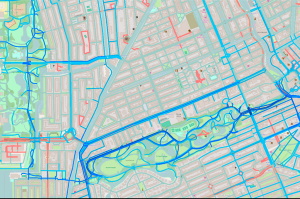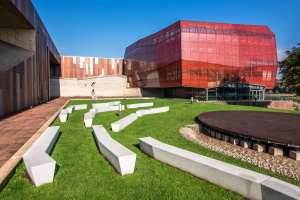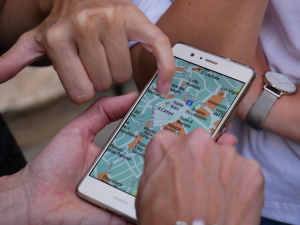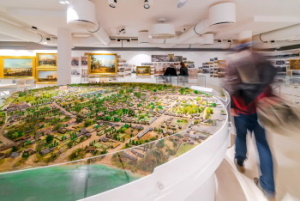
The theme for FIG Congress 2022:
 |
This overall theme is addressing two aspects. The first part “Volunteering for the future” is the overall motto for the current term of Office from 2019 to 2022. It reflects the urgent need for volunteers and volunteers’ work and the understanding for and impact on the tasks that are undertaken by International Professional Organisations like FIG. |
|
The second aspect is underlining the significant change in our profession. Decades ago, the standard product of a land surveyor was a topographic map or a cadastral plan. Typically, this product was only partly accessible and often reserved for military and state administration purposes only. This has changed radically. |
|
|
Today geo-information and all related products are seen in a much broader context and as public goods and beneficial for the well-being and betterment of the entire society. In addition to this, we can observe that the current geo-data-products are gaining in quality and are becoming more and more available free of charge for the user. |
 |
The overall theme Volunteering for the future – Geospatial excellence for a better living, is built up by the following sub-themes:
 |
The expression “Surveyor” is here used as a generic term comprising all occupations and professions in conjunction with Geospatial data such as; land surveyors, quantity surveyors, construction surveyors, cadastral surveyors, mining surveyors, photogrammetrists, topographers, cartographers, hydrographers, valuers, geo-informaticians, land and town planners. |
The technologists say that we are at the beginning or even in the middle of the 4th industrial revolution. And our profession is of course affected or in a positive wording profiting from these latest developments like Internet of Things (IoT) or Artificial Intelligence (AI). The numbering “4.0” wants to remind us here of this strong connection between the technical advancements in general and our geospatial activities. Surveyors have always been strongly associated with the most modern ways of presenting data, so they fit perfectly into the IoT and AI. Development of sensors lead us to more detailed and accurate measurements providing innovative surveying tools and methods. Automation in workflow that we deal with every day allow us to work more effective and to be competitive. Are we able to use this potential in connection with other fields of science and engineering to continue to stay on the top of technology?
 |
COVID 19 changed the global life radically at all levels. It changed our personal and private life, but also our professional customs and activities. The pandemic created new limitations but at the same time it offered also new opportunities. Because every crisis brings new chances, it would be wonderful to share during the Congress the new experiences and approaches related to digitalization, automation in professional work, teamwork, customer relations and document certification. |
Open access to data is promoted by industry and politicians not only in our professional field.
 |
What are the aspects, consequences, benefits and disadvantages of this approach? On the other hand, the verification of data in repositories is fundamental for sharing reliable data for making decisions. Does authoritative data in repositories compete to open access? What should have open access. How should we deal with crowdsourcing being the opportunity to involve society in geospatial data collection and how it can be useful for surveyors? |
Today we do not only measure and “deliver” a map as the final product. Together with other disciplines new geospatial products which are often of a multi-purpose-use are designed and developed according to the specific needs of the potential users.
 |
What is our role in improving not only the methods of sharing geodata, but also in specialized obtaining in terms of other disciplines? How do we convince our partners from other disciplines that despite progress and automation of measurement techniques with tools and methods available for everyone, they still should need surveyors? |
See also Specification of Topics and Themes
You are encouraged to submit an abstract. Abstracts will be reviewed and if you abstract is approved, you will be asked to submit a full paper and a video presentation. The video presentation must not be longer than 4 minutes. All abstracts, papers, presentation handouts and videos will be included in the final proceedings. All accepted papers and related video presentations will be included in a specific session as inspirational session material and will be available before the Congress starts. The sessions will be designed so that they fit best to the topic, this can be e.g., presentation sessions, discussion panels, interview sessions, open discussion sessions or a mixture of different types. A selection of onsite participating authors from the open call for papers will be invited to directly take part in a session. All onsite authors connected to a session are encouraged to participate actively and engage in the discussions. Online participating authors will have their papers and video presentation included in the final proceedings as inspirational material for a session, but the video presentation will not be played onsite in a session.
The deadlines are as follows:
Submission of:
Submission of:
We encourage you to consider the overall theme of FIG Congress 2022: Volunteering for the future – Geospatial excellence for a better living, and the four main topics when you submit your abstract. Many topics are multi-disciplinary and are relevant in both developing and developed world contexts. We encourage submissions of cross-disciplinary nature cutting across many disciplines/subject-areas.
All papers will be published in FIG Congress 2022 proceedings with ISBN and ISSN number.
Selected (conference) papers will be invited after the Congress to be published in local journals of Association of Polish Surveyors (Geodesic Review and Archives of Photogrammetry, Cartography and Remote Sensing) in translation in Polish supported by journals editorial office or in English in an extended version for the review process. The publication will be free of charge.
Please also check options for prizes
1 SUBMIT AN ABSTRACTIf you would like to have your paper included in the proceedings, start by submitting an abstract. You will need the following: title, abstract, keywords and biographical information. View our Step-by-Step Guide to submitting an abstract. Submit your abstract here. Abstract submission has closed |
2 GET ACCEPTEDAfter we receive your abstract, it moves to the evaluation step. We welcome the submission of abstracts for non-peer review papers until 7 February 2022. Abstracts will be reviewed before mid-March. Deadline for the submission of full paper and abstract for peer review papers is 2 January 2022. |
3 REGISTEROnce your abstract is accepted, you must register to ensure that your paper will be included in the programme and proceedings. Deadline for all authors to register for the Congress is 10 May 2022. |
4 SUBMIT FULL PAPER & VIDEO PRESENTATIONWhen an abstract for non-peer-review papers is accepted, you must submit your max. 15 pages paper to fig@fig.net by 10 April 2022. Deadline for the submission of your maximum 4-minute video presentation is 7 August 2022. |
5 PUBLICATION OF PROGRAMMEYour paper and video presentation will be included in a session as inspirational and preparation material and will be available before the Congress starts. |
6 ATTEND THE CONGRESSEnjoy the Congress and connect with fellow participants. A selection of authors from the open call will be invited as presenter/panellist in sessions. |
Proposals for papers non-peer review and peer review are requested in all topics of interest of the following:
The Permanent Institution of History for Surveying and Measurement invites contributions on the history of surveying and measurement, and the techniques and instrumentation involved.
Papers are also invited on the areas covered by FIG Networks:
Young Surveyors Network invites contributions from young surveyors in all ten Commissions.
Standards Network invites contributions on standards related to the surveying and geospatial profession. Possible topics include:
Regional Capacity Development Networks: Africa and Asia/Pacific
Asia/Pacific Capacity Development Network invites contributions on the following topics:
The Scientific Committee of the Technical Programme: |
The Scientific Committee of the Peer Review Papers |
|
Chief Editor: Volker Schwieger, Germany Members:
|
Review team of more than 100 reviewers. For the list of reviewers, please visit: http://fig.net/resources/publications/prj/index.asp
Download.pdf |
Any inquiries on call for Papers, abstracts, peer review process, technical programme or video presentation, please contact the FIG Office (Email: fig@fig.net, tel +45 9391 0813).